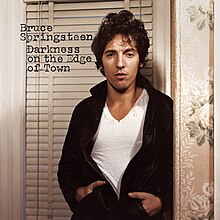Darkness On The Edge Of Town
| Darkness on the Edge of Town | ||||
|---|---|---|---|---|
 |
||||
| Studio album by Bruce Springsteen | ||||
| Released | June 2, 1978 | |||
| Recorded | October 12, 1977 – March 19, 1978 | |||
| Studio | Record Plant Studios in New York | |||
| Genre | Hard rock, rock and roll | |||
| Length | 42:55 | |||
| Label | Columbia | |||
| Producer | Bruce Springsteen, Jon Landau, (Assistance:) Steven Van Zandt | |||
| Bruce Springsteen chronology | ||||
|
||||
| Singles from Darkness on the Edge of Town | ||||
|
||||
| Professional ratings | |
|---|---|
| Review scores | |
| Source | Rating |
| AllMusic | |
| Chicago Tribune | |
| Christgau's Record Guide | B+ |
| Encyclopedia of Popular Music | |
| MusicHound Rock | 4.5/5 |
| Pitchfork | 9.5/10 |
| Q | |
| Rolling Stone | |
| The Rolling Stone Album Guide | |
| The Village Voice | A– |
Darkness on the Edge of Town is the fourth studio album by Bruce Springsteen, released on June 2, 1978. The album marked the end of a three-year gap between albums brought on by contractual obligations and legal battling with former manager Mike Appel. Although the album did not produce high-charting singles it nevertheless remained on the charts for 97 weeks. A steady seller in Springsteen's catalogue, it has been certified triple-platinum by the RIAA.
Reviews for Darkness on the Edge of Town were overwhelmingly positive. Critics notably praised the maturity of the album's themes and lyrics. It remains one of Springsteen's most highly regarded records by both fans and critics and several of its songs have become staples of the singer's live performances.
In September 2010, a documentary film chronicling the making of Darkness was first shown at the Toronto International Film Festival. Quoting Springsteen as saying “More than rich, more than famous, more than happy – I wanted to be great”, reviewer Stephen Whitty of the Newark Star-Ledger commented: "For many fans, that long journey pulled onto the Turnpike here." In 2003, Rolling Stone Magazine ranked it at #151 on their list of the greatest albums of all time.
Recovering from legal troubles and the stress of the breakthrough success of Born to Run, Springsteen released a somewhat less commercial album in Darkness on the Edge of Town. In terms of the original LP's sequencing, Springsteen continued his "four corners" approach from Born to Run, as the songs beginning each side ("Badlands" and "The Promised Land") were martial rallying cries to overcome circumstances, while the songs ending each side ("Racing in the Street", "Darkness on the Edge of Town") were sad dirges of circumstances overcoming all hope. Unlike Born to Run, the songs were recorded by the full band at once, frequently soon after Springsteen had written them.Steven Van Zandt received a credit for production assistance for helping Springsteen tighten the arrangements from Born to Run's epic sound.
...
Wikipedia
